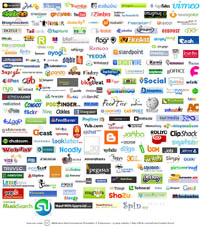I’ve buckled down and decided that, as I never really play them any more & I’m tired of dragging their crates from apartment to apartment, it’s time to rip all my old CDs and get rid of the physical detritus. I’ve been doing this slowly, taking the opportunity to listen to them all again, which draws me to the inexorable conclusion that I’ve bought an awful lot of bad music over the years. At what point did I decide that I needed the entire recorded output of the Telstar Ponies? how many CDs by The Fall does any one person really need? whatever happened to my Joy Division box set? But it’s interesting handling the CDs as objects: for the majority, I can remember where they were acquired and sometimes the circumstances that I listened to them in. As an exercise in personal archaeology, I’ve been writing down what I remember.

It’s self-indulgent, a nostalgic activity. Proust, the particular lens through which I’ve been looking at the world lately, explains the experience quite nicely, but with books:
This is because things – a book in its red binding, like all the rest – at the moment we notice them, turn within us into something immaterial, akin to all the preoccupations or sensations we have at that particular time, and mingle indissolubly with them. Some name, read long ago in a book, contains among its syllables the strong wind and bright sunlight of the day when we were reading it.
(p. 193 of Ian Patterson’s translation of Finding Time Again.) This is also a more eloquent version of the image evoked near the end of what’s become almost a standard script, the conversation that I fall into when explaining my job to someone new. “No, the Institute is not going to be taking your books away,” I assure people. “Good,” they say, “my books are special.” And then I’m told exactly why their books are special, which generally has to do with the same constellation of nostalgia, memory, and personal history that’s cohered around my old CDs. With books, it’s solidified to be almost a critical tradition, one of the primary arguments leveled against electronic attempts at replicating the functionality of books. Sven Birkerts pioneered this approach, and it’s since been picked up by most would-be defenders of the book. The most recent I’ve read is that of William Gass titled “A Defense of the Book,” in A Temple of Texts, his latest collection of essays; it’s a title that could serve for any number of essays standing firm against anti-nostalgists.
The core of these arguments is this: that our nostalgia towards books indicates an ineffable quality of the book as an object that can’t be digitally replicated. It’s a vague argument at best; as such, it’s a difficult one to dispute. Often it’s simply brushed aside: condescending to nostalgia isn’t a worthy use of the technologist’s time. But it’s usually a stopping point in arguments about digitalization, and as such it bears scrutiny.
The passage I quoted above from Proust is a useful tool for the job. The background: this is an episode in the last volume of Proust’s novel. At this moment he happens to pick up a book that his mother read to him as a child, George Sand’s François le champi. The book transports him into a cascade of memories, and then into reflection on how memory works, and how objects get tangled in the skeins of our memory. The trigger of memory is of particular interest; here, Proust seizes upon the problem of materiality. Is it the book itself, or the words in the book? The first sentence suggests the former: the red binding of the book has an aura about it. But the second sentence, with its crisp images, suggests that the content of the book, the forgotten name on the page, is what’s really important.
There’s something else interesting here which doesn’t usually get remarked upon, though this is a famous image in Proust’s work: the book that the narrator picks up isn’t the book he read as a childhood. It’s another copy of the same book. He’s not in his childhood home, but rather in the library at the house of a friend, and this is another copy of François le champi. In all probability, the binding of the book he picks up (made, as he notes, to match all the other books in the library) is different to the binding of the book he picked up as a child. It’s worth noting that it’s the syllables of the spoken (even silently) word – does a word on a page have syllables? – that contain memory.
In a way, this makes perfect sense: the madeline that the narrator dips in tea in the beginning of the novel is obviously not the same madeline that he dipped in tea as a small child. But in a way, Proust is illustrating what might be the central artistic crisis of the twentieth century, the problem of human response to mechanical reproduction. It’s a problem that falls squarely into the category of “job description” at the Institute.

To the rescue: another Marcel, Duchamp, comes to mind, an artist whose body of work seems to have been created with an eye to preparing us to live in an age where originals are lost in a sea of copies, an age in which, as Marx & Engels predicted, “all that is solid melts into air.” With Duchamp begins the idea of the multiple: many instances of the same work of art like the many copies of a book that can be printed or the many photographic prints that could be made from a negative. “The idea of multiples is the distribution of ideas,” said Joseph Beuys. In one sense, Duchamp’s introduction of the multiple is art catching up with Gutenberg; in another, it’s a carefully orchestrated shift in values between the concrete and the virtual.
What can Duchamp teach us about nostalgia? His work carefully separates artistic value from the enclosing objects. Take, as an example, Duchamp’s famous readymades – the urinal, the bicycle wheel, the snow shovel, etc. Although his urinal has been described as the single greatest work of art of the twentieth century, it no longer exists: like the originals of most of his other readymades, it seems to have mysteriously disappeared at some point. There are, however, an unending parade of copies. Duchamp made his own miniature copies of them for his Box in a Valise, his autosummarization of his career as an artist. He happily authorized Arturo Schwartz to create his own copies of his readymades. At the Whitney Biennial right now, Sturtevant has taken it upon herself to make her own copies of the readymades. Duchamp, were he still alive, would probably cheerfully add these to his procession of simulacra.
The artist’s thought, Duchamp declared, is more important than the object to which it is attached: the object of art serves is a container for the thought of the artist (just as the book is a container for the text within). As viewers of art, we should concentrate, Duchamp thought, on the idea behind what we see, not what we see. Moreover, he argued, this is what had always been the value of art. In an interview with Alain Jouffroy in 1964 he classified painting into two varieties, the kind
intended only for the retina . . . and the kind of painting which reaches beyond the retina, using the paint tube as its springboard for reaching much farther. This was the case with the religious painters of the Renaissance. The paint tube didn’t interest them. What interested them was the idea of expressing the divine in one form or another. Without wanting to do the same, I maintain that pure painting as an aim in itself is of no import. My aim is something completely different: for me, in consists in a combination, or at least in an expression, which only the grey cells can reproduce.
He saw his work, of course, as aspiring to be the latter sort of art. Recent history would seem to bear out the avowedly atheist Duchamp enlisting the religious painters of the Renaissance in his camp: one of Schwarz’s copies of his urinal was recently attacked with a hammer as if it were Michaelangelo’s Pietà.

As odd as Duchamp considering himself as among the religious painters might be my recruitment of Proust against object-nostalgia. Proust is generally perceived as glorying in the past: his novel is about the process of looking backwards. But this isn’t entirely justified: note this passage from Finding Time Again, which occurs shortly after the episode quoted above:
Some used to say that art in a period of speed and haste would be brief, like the people before the war who predicted that it would be over quickly. The railway was thus supposed to have killed contemplative thought, and it was vain to long for the days of the stage-coach, but now the automobile fulfils their function and once again sets the tourists down in front of abandoned churches.
(p.197.) This comes startlingly close to language we use regularly at the Institute (the trope of the horseless carriage and so on). New technology doesn’t kill art or thought: it changes it, and change itself is morally neutral. And again: like the object of the book, the stage-coach and the automobile are both vehicles, both means to an end. We shouldn’t feel nostalgia for the vehicle: we’re using it to get somewhere, and there are other ways to get to the same end. Proust shouldn’t be construed as saying that the march of progress is entirely a good thing: people might stop visiting the abandoned churches. But it would be foolish to imagine that people stopped visiting the abandoned churches because they abandoned stage-coaches for automobiles.

To go back to where I started from: my decision to chuck my CDs doesn’t seem that strange: plenty of other people are doing the same thing. Though vinyl records seems to function, for those older than myself, as reservoirs of nostalgia, music would seem to have firmly wandered into the realm of the digital. Could we care about DVDs? HD-DVDs? It doesn’t seem that likely. It’s more useful to have these things in object-free form: if an album’s on my hard drive, I’ll probably listen to it more often than if its a CD in a crate under my bed. Nor am I really adding CDs to the crate: while I’m still happily consuming music, I’m buying most of it in digital form from places like http://www.kompakt-mp3.net.
A caveat: I’m not trying to make a universal argument. I’m not throwing out all my CDs: certain objects do have very personal associations (those given as gifts, for example). (And Duchamp, a man who relished self-contradiction, would probably have recognized this: he took extraordinary precautions to save his work.) But I don’t think that we should imagine that nostalgia is explicitly a function of the container, be that container the CD or the book. A book is, after all, a multiple, a mass-produced object. Nostalgia’s not built in at the press: it’s something that we put into our books. There are exceptions (an artist’s book produced for a hand-picked audience, for example), but that exceptionality should be recognized as part of their value and not taken for granted.

And a coda: if humanity outlasts the book, nostalgia will outlast the book, which it preceded. It’s codified perfectly in this fragment (translated by Guy Davenport) of the Greek poet Archilochos, who was born around 680 B.C.E., died around 645 B.C.E. and probably never saw a book in his life:
How many times,
How many times,
On the gray sea,
The sea combed
By the wind
Like a wilderness
Of woman’s hair,
Have we longed,
Lost in nostalgia,
For the sweetness
Of homecoming.
 Ben’s post on the Google book project mentioned a fundamental tenet of the Institute: the network is the environment for the future of reading and writing, and that’s why we care about network-related issues. While the goal of the network isn’t reducable to a single purpose, if you could say it was any one thing it would be: sharing. It’s why Tim Berners-Lee created it in the first place—to share scientific research. It’s why people put their lives on blogs, their photos on flickr, their movies on YouTube. And it is why the people who want to sell things are so anxious about putting their goods online. The bottom line is this: the ‘net is about sharing, that’s what it’s for.
Ben’s post on the Google book project mentioned a fundamental tenet of the Institute: the network is the environment for the future of reading and writing, and that’s why we care about network-related issues. While the goal of the network isn’t reducable to a single purpose, if you could say it was any one thing it would be: sharing. It’s why Tim Berners-Lee created it in the first place—to share scientific research. It’s why people put their lives on blogs, their photos on flickr, their movies on YouTube. And it is why the people who want to sell things are so anxious about putting their goods online. The bottom line is this: the ‘net is about sharing, that’s what it’s for.












